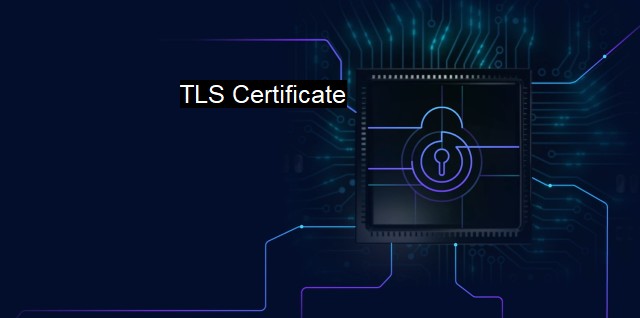What is TLS Certificate?
Understanding TLS Certificates: Now More Essential Than Ever for Cybersecurity and Antivirus Protection
Transport Layer Security (TLS) Certificate, often referred to as an HTTPS or SSL certificate, operates as an important frontline guard against cyber threats, ensuring safer data interchange over the Internet by encapsulating the process of decoding and encoding sent and received data, tools, and services. The TLS Certificate plays a vital role in the domain of cybersecurity, functioning as a protector against a rampant menace in the digital world.The utility of a TLS Certificate is predicated on the nature of information transfer on the Internet. Given the complexity and extent of the virtual world, the volume of data changing hands and crossing boundaries can be colossal. This constant flux exposes the data to numerous potential threats such as hackers and covert spy programs seeking to exploit any weaknesses in the system to gain unauthorized access to the information.
The TLS Certificate enters the picture as an integral cryptographic protocol that proffers security over a computer network, establishing and ensuring encrypted and verified transmission between clienteles. The strength of these certificates is their ability to generate a public key system of differing encryption codes, shared only between the sender and the receiver. This twin-key system demolish the chances of information diversion or interception, effectively creating an insurmountable firewall for cyber criminals.
These certificates further their reliability with institutional authenticity that is communicated to their receiver. the certificate procedures verify the website's credibility and identity by validating its institute and server identity, considerably trimming the prospect of deceptive and uninformed interference or data breaches.
In the same vein of information security maintenance, where fallbacks like antivirus software are needed to counter softer cyber vulnerabilities such as malware and viruses, TLS Certificates act as the foundational security structure for harder, more advanced cyber vulnerabilities.
It's worth mentioning, though, that while the antivirus programs scrutinize data for harmful pieces and quarantine them to restrict spread, TLS certificates dodge the threat scenario entirely by keeping the flow of data well-encrypted and authenticated, thus, minimizing chances of threat intrusion.
Having a TLS certificate prop up one's shield of security it escalates the trust customers put into websites, specifically in e-commerce platform or any place where financial information is shared. Without these certificates, savvy users might notice their missing padlock sign indicating secured connection, and veer afar, substantially downwards spiraling trust ratings.
TLS certificates can also aid in website ranking as search engines like Google, appreciating the security of visitors, rank the websites protected by SSL or HTTPS relatively higher than others.
Despite this immense cybersecurity utility, the effectiveness of a TLS Certificate is contingent on its proper implementation. A flawed application could steer to a void sense of security, introducing multiple openings for malicious maneuvers, while slowing down site responsiveness due to unnecessary encryption. Maintaining a check on certificate validity and updating or replacing expired certificates is also exceedingly crucial for upholding security.
To sum up, a TLS Certificate operates as an identity card for a website and ensures provenance and integrity of the information shared across. Coordinated with a proficient antivirus system and, updated regularly, its successful execution could substantially minimize cyber threats, amplify user trust, and foster an environment conducive to safe and secure data interchange.
Notwithstanding the tireless efforts of cyber defenders, the protean threat of cyber-attacks continues to advance, rendering cybersecurity a moving target and mandating constant vigilance and evolution in protective techniques, with the TLS Certificate thereby emerging as a critically effective tool offering vital business and data protection.

TLS Certificate FAQs
What is a TLS certificate?
A TLS certificate is a digital certificate that establishes the authenticity of a website or server and encrypts communications between the server and the user's browser. It provides secure and encrypted communication over the internet, protecting sensitive data from cyber attackers.Why is a TLS certificate important in cybersecurity?
A TLS certificate creates a secure connection between a web server and a user's browser, protecting sensitive information such as passwords, credit card details, and personal data from being intercepted by cyber attackers. Without a TLS certificate, any data transmitted over the internet can be accessed by unauthorized parties.Can an antivirus protect against TLS certificate attacks?
An antivirus program cannot protect against TLS certificate attacks directly, as the certificate is integral to secure communication. However, some antivirus programs can check for potential security risks in the certificate chain, such as the use of expired or insecure certificates.What is the difference between TLS and SSL certificates?
TLS and SSL are both cryptographic protocols used to secure internet communication. SSL is the predecessor to TLS, and while they are often used interchangeably, they are not the same. TLS is considered more secure than SSL and is the recommended protocol for securing online communication. TLS certificates are installed on web servers to encrypt data in transit, while SSL certificates have mostly been phased out due to security concerns.| | A | | | B | | | C | | | D | | | E | | | F | | | G | | | H | | | I | | | J | | | K | | | L | | | M | |
| | N | | | O | | | P | | | Q | | | R | | | S | | | T | | | U | | | V | | | W | | | X | | | Y | | | Z | |
| | 1 | | | 2 | | | 3 | | | 4 | | | 7 | | | 8 | | |||||||